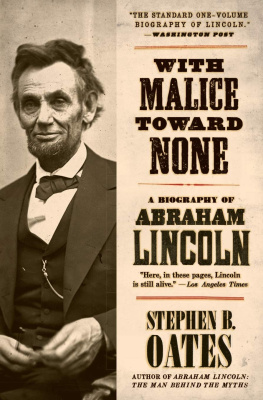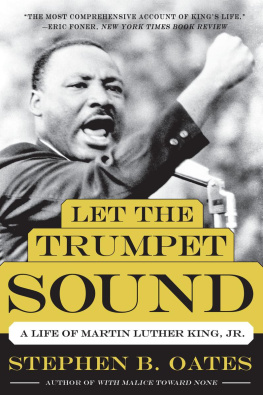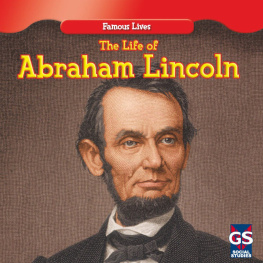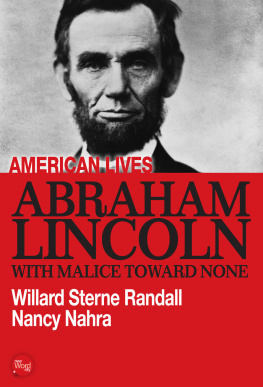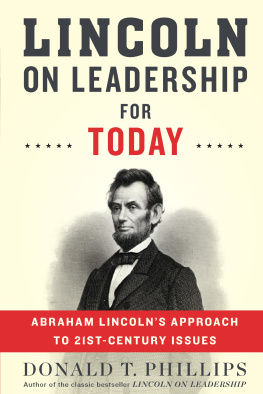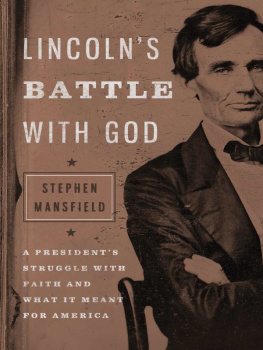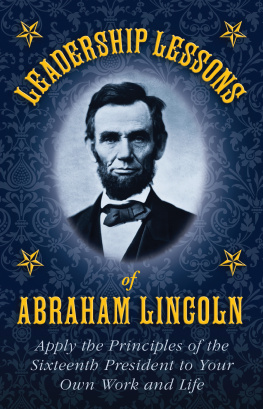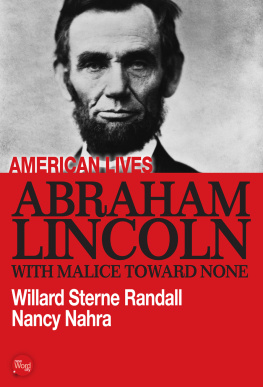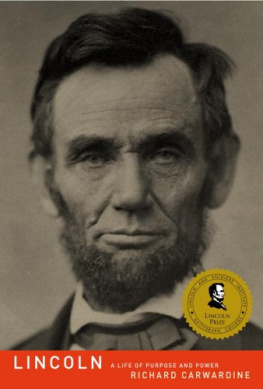Stephen B. Oates
The biographers mission is to perpetuate a man as he was in the days he liveda spring task of bringing to life again .
I hope, however, that the following pages may prove to be of interest from the strictly biographical no less than from the historical point of view. Human beings are too important to be treated as mere symptoms of the past. They have a value which is independent of any temporal processeswhich is eternal, and must be felt for its own sake .
I shall do nothing in malice. What I deal with is too vast for malicious dealing .
A. Lincoln to a Louisiana Unionist, 1862
I
S ince it was first published in 1977, With Malice Toward None has enjoyed a critical and popular reception beyond all my expectations. It was extensively reviewed, was a Book-of-the-Month Club selection, got me on the Today Show with Tom Brokaw, won several awards, appeared in various foreign editions, came out in a paperback edition that was highly successful, and elicited a great many letters from readers all over the world. I like to think that readers identified with the Lincoln in my story, as I did. For behind the myths, behind the god of marble and stone, I had discovered a man of rich humanitya principled man who understood the complexities of human nature, a self-made man who was proud of his achievements, substantially wealthy, morbidly fascinated with madness, obsessed with death, troubled with bouts of melancholia, and gifted with a major talent for literary expression.
I also like to think that readers were attracted to my empathetic narrative voice, for empathy is what calls a human being back from the darkness. In Frank Vandivers felicitous phrase, empathy is the biographers quintessential quality, his spark of creation. Empathy is not the same thing as hero worship. On the contrary, it is an attempt to understand frailty and failings in another, not hide from them. It is an effort to experience other human beings, by seeing the world from their view, feeling their feelings, and thinking their thoughts. To be properly empathetic, the biographer must be prepared to walk many a lonely mile in his subjects footsteps. Certainly I tried to do that in my pursuit of Lincoln: I walked in his footsteps in New Salem, Springfield, and Washington, D.C. I sat in his head and heart so much that I got depressed when he did; I laughed when he laughed. When I left my study after a days writing in his world, I was stunned to find myself in the twentieth century. I hope that my readers have a similar sensation when they put the book down. If I have done my job properly as a biographer, they will willingly suspend their knowledge of how the story ends and allow my narrative to transport them back into Lincolns world, where they can walk with him as his life unfolds, sharing in his humanity.
In my original Preface, I claimed that I was presenting not the Lincoln of myth and legend, but the actual man of history. This was a misleading statement, for it suggested that no art was involved in my reconstruction of his life, that all I or anyone else had to do was to examine the facts critically and there the real Lincoln would be. When I referred to resurrecting the Lincoln of history, I did not mean that a definitive portrait could be shaped that would stand forever as the way he really was. As Ive said elsewhere, historical biography is an interpretive art, not an exact science. The very materials we use to forge biographyletters, journals, diaries, interviews, recollections, and the likewere all recorded by people who filtered things through their own perceptions and sensibilities. Because biographical materials are themselves imprecise and interpretative, it is impossible for anyone to produce a definitive biographya fixed and final portraitof Lincoln or any other figure. As we strive for biographical and historical truth, the best we can hope for is a careful approximation of what Lincoln was like in the days he lived. With Malice Toward None , then, is my approximation of Lincoln, based on authenticated detail and a synthesis of Lincoln scholarship.
II
I f my biography has had its share of successes, it has also been the subject of an acrimonious public debate about its integrity. In 19901991, a literary critic, a professor of classics, an associate professor of criminology, and two historians contended that I had plagiarized in writing With Malice Toward None . They cited as evidence similarities of phrases and short bits of factual matter between my account of Lincolns early years and that in Benjamin Thomass 1952 biography. The original accusers presented their challenge at a symposium of the Illinois State Historical Society, which had elected not to forewarn me about the nature of the complaint. According to a historian who was present, the symposium organizers hoped that the charges would get into the New York Times the next morning. They were disappointed, he said, when the Times ignored them.
After studying the allegations, I issued a public rebuttal, pointing out that Lincoln literature consists of a common body of knowledge about him, particularly his well-known early years, that has accumulated for more than a century and is in the public domain. If there are similarities between my book and Thomass, I said, it is because both biographies draw from that common text or body of writing and information. I emphasized the point that there are also similarities of facts and phrases between Thomass work and previous Lincoln biographies by Albert J. Beveridge and Carl Sandburg. In truth, there are textual similarities among Lincoln books as a whole, for the simple reason that they derive from and are part of a common body of recorded knowledge. In conclusion, I drew on James E. Porters fine article on intertextuality, which appeared in Rhetoric Review (Fall 1986). Examining texts intertextually, he states, means looking for traces, the bits and pieces of Text which writers or speakers borrow and sew together to create new discourse. In writing With Malice Toward None , to borrow Porters words, I took the bits and pieces of the Lincoln biographical tradition and tried to weave it into a new discourse.
In response to my rebuttal, twenty-three prominent Lincoln and Civil War scholars, including five Pulitzer Prize winners and one Parkman and Bancroft Prize winner, issued a public statement rejecting the allegations of plagiarism as totally unfounded. Subsequently, the University of Massachusetts at Amherst, my employer, announced that distinguished scholars of two departments had examined the charges and had found them groundless. The American Historical Association, after dragging the case out for a year and a half, also handed down a verdict against my accusers. With the assistance of specially qualified advisors, the AHA reported later, the Council found that plagiarism had not occurred, but rather an insufficiency of acknowledgment of one particular source ( Perspectives: Newsletter of the American Historical Association , September 1992). In other words, even though I had done nothing wrong, I should have included more references to Thomass biography in my account of Lincolns early years. I and other Lincoln scholars disputed that point, since Thomass scholarship is cited repeatedly in my references and since Thomass own biography has no references at allonly a general discussion of sources at the back.
The matter of attribution in popular biography is a crucial point. Because With Malice Toward None is a one-volume synthesis of Lincoln and Civil War scholarship and because it is directed at a general audience and not just at scholars, it does not contain the kind of copious, line-by-line footnoting associated with a scientific research paper or a historical monograph on an unfamiliar subject. This is something my accusers have persistently misunderstood. Like Thomas, I made no attempt to attribute every line of my text, or to list all the previous Lincoln biographies and histories that had likewise touched on a particular point or episode. What my biography contains are extensive lists of sources and secondary works, keyed to specific pages of text, from which I quoted directly or borrowed original findings and ideas. All told, there are thirty-seven pages of annotations at the back of this volume, compared to seventeen pages in Thomass. By the standards of popular biography, With Malice Toward None has more than adequate attribution of its sources.

